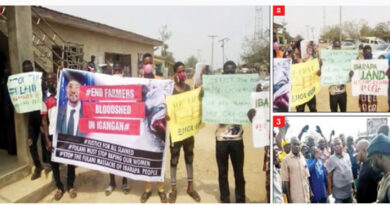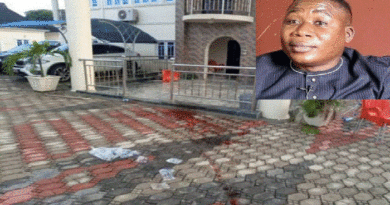DisCos Disobey NERC’s Order On Capped Estimated Billing Again
DisCos disobey NERC’s order on capped estimated billing despite the directive by the National Electricity Regulatory Commission (NERC) to distribution companies (DisCos) to cap estimated bills for electricity consumers, most of the distribution firms are not complying with the order as Nigerians without prepaid meters across the country are still billed heavily.
The Newera News authoritatively reports that most consumers, especially in Southwest, Southeast Nigeria, are still heavily billed
NERC had in February this year issued order No/NERC/197/2020 on capping of estimated billings in the Nigerian Electricity Supply Industry (NESI), thereby placing a cap on estimated bills to unmetered customers.
This was to protect unmetered R2 (Residential single and 3 phase meters, which consumes more than 50kwh per month) and C1 (commercial single and 3 phase meters, small businesses) customers from estimated and arbitrary billing and hopefully hasten the process of metering.
It is also aimed at reducing incidents of high collection losses in NESI.
NERC and the ministry of power had also set a target to close the metering gap in the country by December 2021.
The DisCos had last week disclosed that they were losing N13.9 billion monthly to the capped estimated billing order issued by the NERC.
But electricity consumers who spoke with our correspondents disagreed with them, arguing that as a proof of non-compliance to the NERC order, the DisCos were still billing consumers outrageously.
The Jos Electricity Distribution Company (JEDC), Abuja Distribution Company (AEDC), Enugu Electricity Distribution Company (EEDC), among others, were cited by consumers as complicit in flouting NERC’s directive.
A cross section of residents in the Bauchi metropolis in northern Nigeria said the Jos Electricity Distribution Company (JEDC) was not making things easy for electricity consumers in the area as it has continued unabated with the old estimated billing regime.
Fatima Julu, a resident of Birshin Fulani metropolis, said she pays between N3,000 and N4,000 every month in charges for electricity.
“They could not provide us with prepaid metres but continue to charge us heavily. They said we have to buy prepaid metres which cost about N46,000 and if one cannot afford it, one will continue to pay higher charges,” She said.
Checks in Umuahia, the Abia State capital, and Aba revealed that many consumers were aware of the NERC directive to cap estimated billing but were surprised that the Enugu Electricity Distribution Company (EEDC) was yet to comply with it.
They lamented that even in the face of the directive, their bills had continued to escalate, whether there was power supply or not, despite several complaints to the EEDC.
Comrade Emele Onyekwere, a fashion designer in Aba, maintained that for the past seven years, his monthly bill has been swinging between N11,000 and N13,000.
He said he had expected that with the new NERC order, his monthly bill would drop but that never happened.
Another consumer, Miss Chidinma Okore, claimed that she was not aware of the NERC directive.
According to her, owing to outrageous bills, one of her neighbours just recently opted for the disconnection of his apartment from the supply line and now relies on his generator set.
Another consumer who did not want his name in print said his monthly bill has never been less than N6,500 even after NERC’s order.
“It does not matter whether we were supplied light for the greater part of the month or not. “The worst of it is that any delay in the payment of the outrageous bill will lead to the disconnection of the line,” he said.
An Asaba- based civil servant, Mr Emeka Biosa, also complained about the outrageous bill residents are forced to pay monthly since the NERC order.
He stated: “My bill was initially N10,000 every month in my three-bedroom apartment even though I couldn’t boast of 5 hours of power supply daily. In January this year, I protested severally before it was reduced to N6,000 monthly.”
He, therefore, urged the government to wield the big stick on earring DisCos.
Mr David Okoro, a resident in Owerri, Imo State, also complained that electricity has not been as stable as it used to be and at the end of every month, they pay a bill of N15,000 even though the government had said the bills should be reduced.
Checks by LEADERSHIP Sunday also showed that despite the introduction of the MAP scheme in 2018, more than half of registered electricity consumers in the country are yet to be metered due to unavailability of the equipment and its high cost.
A consumer, Okwonkwo Edwin, said up to two-thirds, if not more, of residents of Shasha community in Akownjo, Lagos State where he lives have not been able to access the meter under MAP.
According to him, many of the residents complained that times were hard and the meters were quite expensive.
“To be frank with you, I have not gotten. I was preparing to go for it when all of a sudden we were told the price has been increased,” he said.
Due to the new Value Added Tax (VAT) that came into effect in February, single-phase meter which used to sell for about N37,000 went up to over N44,000, while three-phase meter that sold for N67,000 now goes for about N73,000.
Okonkwo, however, said he would do everything possible to get the single phase within the shortest time possible “to avoid the crazy bill that I pay every month even as we hear that the estimated bills had been capped.”
In Abuja, Ahmad Hamza, who began to live in Sahara Dabo Estate around Life Camp three months ago, narrated his ugly experience in the hands of AEDC officials on a power-focused WhatsApp platform for stakeholders to have a feel.
said after filling a form for a 3-phase meter for his new apartment, he had to go through a lot of stress to get the contract number which requested that he pays N72,085.04k.
Upon going to the bank severally to pay without result, he finally succeeded through a neighbour who works with AEDC and after several failed attempts to get connected, he finally got it and yet was billed N45,871.11k for the three months as those officials who came to his house claimed he was not connected through a meter.
According to him, when he pleaded to pay N20,000 and complete it later, the officials went ahead and disconnected him.
A stakeholder, Yusuf Shuibu, while participating in a heated argument between stakeholders and some DisCos’ officials on social media recently wrote: “DisCos create plenty of bottlenecks to frustrate customers seeking meters. Estimated billings is a ripoff . My bill in Ilorin then was between N14000 to N17000 monthly; after overcoming the meter battle the house consumes less than N8000 monthly.”
Checks by this paper also revealed growing concerns among Nigerians over the inability of DisCos to provide electrical facilities such as transformers, cables, poles among others, to electricity consumers, even as power supply has remained generally epileptic.
The president, Network of Electricity Consumers Advocacy of Nigeria (NECAN), Tomi Akingbogun, said NERC is to blame for most of the anomalies going on in the sector.
His words: “NERC is the one that makes the rules guiding all operators in the industry, and it is the same NERC that ought to enforce the rules, but the reverse is the case here.
“If not, it was the same NERC that said procurement of transformers, cables and others is not the responsibility of consumers; it is the same NERC that has not taken the necessary action in all these matters, even when the practice has become glaringly rampant.
“The customers are not to blame because they know the DisCos hardly respond when it comes to investing on infrastructure, and they need the light”.
He said it was even very annoying to see that after all the claims of the DisCos at privatisation, they had even succeeded in shifting the burden of buying meters on customers.
According to him, NERC lacks the boldness to implement its own rules, while the DisCos are not sincere and have shown lack of capacity and commitment.
The Electric Power Sector Reform Act (EPSRA) of 2005 which still guides the largely privatised Nigerian Electricity Supply Industry (NESI) stipulates that it is not the responsibility of electricity customer or community to buy, replace or repair electricity transformers, poles and related equipment used in the supply of electricity, but that of the operators.
Consequently, the federal government had warned on several occasions that consumers of electricity should not buy any of the facilities on their own.
However, after seeing that the practice was becoming commonplace at a time, NERC issued a “Regulation for Investment in Electricity Networks” whereby customers desirous of intervening in the restoration of power supply may invest in the provision of materials and installation.
The regulation provides that such an arrangement must always be on the basis of an executed “Project Agreement” between the customers and distribution company in which the costs and the mechanism for recovery of the investment are mutually agreed between the parties.
But LEADERSHIP Sunday learnt that in most cases, the DisCos didn’t undertake paying back to those who invested personal resources in facilities or installations where they (DisCos) seem not to be forthcoming.
Narrating his ordeal, Mohammed Ibrahim, a resident of APC Quarters in the Suleja local government area of Niger State said they bought electrical facilities and paid electricity workers for installation and connection to have light in the area.
He said, “For you to have light here you have to use your personal money to buy the materials and pay the same electricity workers for installation and connection, because when you go to their office they would say they do not have the materials on ground and ask you to wait for them to arrange for it.
“And you have to wait indefinitely but to no avail at the end, so most people pay for the logistics personally to have light, though not without their consent, and even at that, you have to pay them connection fee.
“The transformer we use now was donated to the community by one Dr Husseni. But we had to contribute money to buy the likes of cables, poles, copper links among others; it is only the light that is supplied by the Abuja Electricity Distribution Company (AEDC). Anything concerning electrical materials and their installations in the area we pay for it ourselves.”
Another resident in Zone E of the area, Ali Hakeem, who corroborated this, said an individual, Mr Usman, the owner of Global Vision Academy, bought the transformer they were connected to initially, adding that they had to switch to a community-owned transformer after the one bought by Usman packed up, perhaps, due to overload.
He noted: “At the initial time, anybody that wanted to be connected would pay him money in the region of N120, 000 to N150, 000, but now that the community has grown large, people were asked to pay around N50, 000.
“At a time, even as some of us considered what was happening as the exploitation of the highest order, the transformer had a problem and packed up, so we were transferred to a community-owned transformer.
“Then individual households had to contribute money to get the wires and switch over, but after that, we discovered that the light is not stable; it was fluctuating up and down. So we were asked to buy several other things which we did.
“The transformer has 3 units; ours is one and we were told to buy many things including a copper link, and we did. We even had to pay the electricity workers. And when they were to come and do the job, they said we should pay for the power outage, saying that during that time they would have to put off the light to do their job, and we paid N10, 000.
“We have about four transformers at APC quarters and I am not sure any of them belong to AEDC,” he narrated.
Okonkwo Edwin, a resident of Shasha in the Akowonjo area of Lagos State, said they contributed money to buy the poles and cables and other facilities in his immediate community.
He said having gotten their materials ready, they still had to invite the workers for installation and connection at their own cost, adding that there was a time when their transformer got so bad that they had to suffer blackout for about two months “and when we got tired of waiting for Ikeja Electricity Distribution Company (IKEDC), which supply light to the area, all households were asked to contribute money to buy damaged parts and invite the electricity workers to come and fix it.”
He said, “People usually resort to procuring the materials by themselves with the tacit approval of the distribution companies (DisCos)’ officials, after waiting so long for them to come and solve the problem but to no avail.”
Okonkwo, who blamed the federal government for what he described as electricity consumers’ nightmare in the country, regretted that about six years after privatisation, the situation of power across the country has not witnessed any significant improvement from what it used to be under the defunct Power Holding Company of Nigeria (PHCN) to justify the reforms.
He, however, acknowledged some improvement in power supply and the manner in which officials of Ikeja DisCo responds to light issues in his community in recent days, saying there was still much room for improvement.
The situation is not different in Ado, New Nyanya and Masaka communities of Karu local government area in Nasarawa State, bordering the FCT, Abuja, which are under Abuja DisCo.
A resident of Angwan Doka in New Nyanya, Collins Igwe, told our reporter that the area had been having the challenge of getting a transformer.
He said the area used to have an old 1, 000KVA transformer which later packed up after the community had invested huge money in fixing it severally, and after making series of request to AEDC, a 500KVA transformer was brought and installed about 2 years ago with a promise to bring another 500KVA shortly after that which they never brought again.
“The most painful aspect is that they keep bringing bills, in most cases, crazy bills because most residents here are not yet metered. At such times, you see them bringing the light to encourage the people to pay,” he stated.
Igwe said the situation has forced some of the residents who could afford it into buying the small 50KVA transformer with the approval of the distribution company.
Another resident of a small community in the area, Mr Alphonsus Igbeta, said arrangements had been concluded by his community to procure its own transformer and the poles, cables and other materials.
LEADERSHIP Sunday learnt that an individual is the owner of the transformer serving the Angwan Baba community in the area at the moment.
An AEDC official who spoke to our correspondent, however, said the problem being faced in the area also has a lot to do with the community itself.
According to him, efforts made by AEDC to improve supply to the area had not been successful due to the activities of saboteurs within the community.
A survey carried in late 2019 showed that some Enugu communities have more constant outages than the power supply.
The people of Owerre Umabor Community, in Eha-Alumonah, Nsukka local government area of the state said they had not seen electricity for two years.
A community leader, Comrade Emmanuel Ugwueze, said their faulty transformer was taken away by officials of Enugu DisCo for repair in 2017. “The DisCo made several promises concerning the power failure, but did not keep even one,” he added.
At Nsukka town of Enugu State, residents also pay to fix their transformers and buy cables too.
Obinna Okafor said in spite of these sacrifices, “we are faced with huge estimated billing and if you don’t pay, they will cut off the supply.”
Also in communities such as Kumbotso, Tarauni, Gwale and parts of Nasarawa local government area in Kano State, residents contribute money to buy and repair faulty transformers.
Most residents claimed that the DisCo often took time to clear faults, leaving them in darkness for weeks or months.
But general manager, media and public affairs of AEDC, Mr Oyebode Fadipe, told LEADERSHIP Sunday that he was not in a position to speak for all the DisCos.
Fadipe contended AEDC had been complying with the NERC order in totality.
He said, “We are one of the first DisCos to announce and declare support for the plan, so there is no way we can float it. But as human beings, there may some pockets of irregularities in one place or the other.
“When such happens, we expect that the customer in question will report at our care centres or even come and meet us at the headquarters, and the problem will be resolved in no time”.




